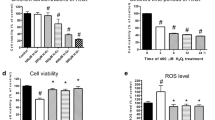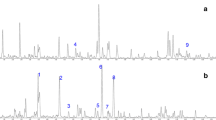Abstract
Autophagy, a self-eating process, is responsible for degradation of long-lived proteins and damaged cellular proteins/organelles. Double-membrane autophagosomes, formed during the process, engulf proteins/organelles and fuse with lysosomes to degrade the contents. It is important to maintain cell homeostasis and many physiological processes including cellular responses to oxidative stress. Oxidative stress induced by myocardial infarction is a major factor of heart failures. In this study, we examined how propofol modulates hydrogen peroxide (H2O2)-induced autophagic cell death in H9c2 cardiomyocytes. H2O2 dramatically induced cell death, which was similarly reduced in the presence of either propofol or autophagy inhibitors (e.g., wortmannin), suggesting that propofol has a protective effect in H2O2-induced autophagic cell death. Acidic autophagic vacuoles were elevated in H2O2-treated H9c2 cells, but they were largely decreased in the presence of propofol. Furthermore, many autophagy-related proteins such as LC3-II, ATG proteins, p62, AMPK, and JNK were activated in H2O2-treated H9c2 cells and were significantly deactivated in the presence of propofol. These results show that propofol regulates oxidative stress-induced autophagic cell death in cardiomyocytes. We further suggest that propofol can act as a cardioprotectant in heart diseases.





Similar content being viewed by others
Abbreviations
- AMPK:
-
5′ AMP-activated protein kinase
- AO:
-
Acridine orange
- ATG:
-
Autophagy-related gene
- I/R:
-
Ischemia/reperfusion
- JNK:
-
Janus kinase
- MAPK:
-
Mitogen-activated protein kinase
- MDC:
-
Monodansylacadaverine
- mTOR:
-
Mammalian target of rapamycin
- PARP:
-
Poly (ADP-ribose) polymerase
References
Arnaoutoglou H, Vretzakis G, Souliotis D, Cambili M, Galaris D, Papadopoulos G. The effects of propofol or sevoflurane on free radical production after tourniquet induced ischaemia-reperfusion injury during knee arthroplasty. Acta Anaesthesiol Belg. 2007;58:3–6.
Black SC. In vivo models of myocardial ischemia and reperfusion injury: application to drug discovery and evaluation. J Pharmacol Toxicol Meth. 2000;43:153–67.
Chen Y, McMillan-Ward E, Kong J, Israels SJ, Gibson SB. Oxidative stress induces autophagic cell death independent of apoptosis in transformed and cancer cells. Cell Death Differ. 2008;15:171–82.
Choi SL, Kim SJ, Lee KT, Kim J, Mu J, Birnbaum MJ, et al. The regulation of AMP-activated protein kinase by H(2)O(2). Biochem Biophys Res Comm. 2001;287:92–7.
Cory S, Adams JM. The Bcl2 family: regulators of the cellular life-or-death switch. Nat Rev Canc. 2002;2:647–56.
Dadakhujaev S, Noh HS, Jung EJ, Hah YS, Kim CJ, Kim DR. The reduced catalase expression in TrkA-induced cells leads to autophagic cell death via ROS accumulation. Exp Cell Res. 2008;314:3094–106.
Hein S, Arnon E, Kostin S, Schonburg M, Elsasser A, Polyakova V, et al. Progression from compensated hypertrophy to failure in the pressure-overloaded human heart: structural deterioration and compensatory mechanisms. Circulation. 2003;107:984–91.
Hwang J, Lee S, Lee JT, Kwon TK, Kim DR, Kim H, et al. Gangliosides induce autophagic cell death in astrocytes. Br J Pharmacol. 2010;159:586–603.
Ichimura Y, Kominami E, Tanaka K, Komatsu M. Selective turnover of p62/A170/SQSTM1 by autophagy. Autophagy. 2008;4:1063–6.
Jin YC, Kim W, Ha YM, Shin IW, Sohn JT, Kim HJ, et al. Propofol limits rat myocardial ischemia and reperfusion injury with an associated reduction in apoptotic cell death in vivo. Vasc Pharmacol. 2009;50:71–7.
Kamiya T, Hara H, Yamada H, Imai H, Inagaki N, Adachi T. Cobalt chloride decreases EC-SOD expression through intracellular ROS generation and p38-MAPK pathways in COS7 cells. Free Radic Res. 2008;42:949–56.
Kiffin R, Bandyopadhyay U, Cuervo AM. Oxidative stress and autophagy. Antioxidants and Redox Signaling. 2006;8:152–62.
Kimes BW, Brandt BL. Properties of a clonal muscle cell line from rat heart. Exp Cell Res. 1976;98:367–81.
Konishi H, Fujiyoshi T, Fykui Y, Matsuzaki H, Yamamoto T, Ono Y, et al. Activation of protein kinase B indeced by H2O2 and heat shock through distinct mechanisms dependent and independent of phosphpatidylinositol 3-kinase. J Biochem (Tokyo). 1999;126:1136–43.
Kroemer G, Marino G, Levine B. Autophagy and the intergrated stress response. Mol cell. 2010;40:280–93.
Kubota C, Torii S, Hou N, Saito N, Yoshimoto Y, Imai H, et al. Constitutive reactive oxygen species generation from autophagosome/lysosome in neuronal oxidative toxicity. J Biol Chem. 2010;285:667–74.
Lang XH, Kleeman LK, Jiang HH, Gordon G, Goldman JE, Berry G, et al. Protection against fatal Sindbis virus encephalitis by Beclin, a novel Bcl-2-interaction protein. J Virol. 1998;72:8586–96.
Levine B, Yuan J. Autophagy in cell death: an innocent convict? J Clin Invest. 2005;115:2679–88.
Mathew R, Karp CM, Beaudoin B, Vuong N, Chen G, Chen HY, et al. Autophagy suppresses tumorigenesis through elimination of p62. Cell. 2009;137:1062–75.
Matsui Y, Nakano N, Shao D, Gao S, Luo W, Hong C, et al. Lats2 is a negative regulator of myocyte size in the heart. Circ Res. 2008;103:1309–18.
Mizushima N, Levin B, Cuervo AM, Klionsky DJ. Autophagy fights disease through cellular self-digestion. Nature. 2008;451:1069–75.
Mizushima N, Yoshimori T, Levine B. Methods in mammalian autophagy research. Cell. 2010;140:313–26.
Noh HS, Shin IW, Ha JH, Hah YS, Baek SM, Kim DR. Propofol protects the autophagic cell death induced by the ischemia/reperfusion injury in rats. Mol Cells. 2010;30:455–60.
Puissant A, Robert G, Fenouille N, Luciano F, Cassuto JP, Raynaud S, et al. Resveratrol promotes autophagic cell death in chronic myelogenous leukemia cells via JNK-mediated p62/SQSTM1 expression and AMPK activation. Canc Res. 2010;70:1042–52.
Ryter SW, Kim HP, Hoetzel A, Park JW, Nakahira K, Wang X, et al. Mechanisms of cell death in oxidative stress. Antioxidants and Redox Signaling. 2007;9:49–89.
Semenza GL, Agani F, Feldser D, Iyer N, Kotch L, Laughner E, et al. Hypoxia, HIF-1, and the pathophysiology of common human diseases. Adv Exp Med Biol. 2000;475:123–30.
Shimizu S, Konishi A, Nishida Y, Mizuta T, Nishina H, Yamamoto A, et al. Involvement of JNK in the regulation of autophagic cell death. Oncogene. 2010;29:2070–82.
Shintani T, Klionsky DJ. Autophagy in health and disease: a double-edged sword. Science. 2004;306:990–5.
Walsh SK, Hepburn CY, Kane KA, Wainwright CL. Acute administration of cannabidiol in vivo suppresses ischaemia-induced cardiac arrhythmias and reduces infarct size when given at reperfusion. Br J Pharmacol. 2010;160:1234–42.
Wang X, McCullough KD, Franke TF, Holbrook NJ. Epidermal growth factor receptor-dependent Akt activation by oxidative stress enhances cell survival. J Biol Chem. 2000;275:14624–31.
Wang H, Xue Z, Wang Q, Feng X, Shen Z. Propofol protects hepatic L02 cells from hydrogen peroxide-induced apoptosis via activation of extracellular signal-regulated kinases pathway. Anesth Analg. 2008;107:534–40.
Wang B, Shravah J, Luo H, Raedschelders K, Chen DDY, Ansley DM. Propofol protects against hydrogen peroxide-induced injury in cardiac H9c2 cells via Akt activation and Bcl-2 up-regulation. Biochem Biophy Res Comm. 2009;389:105–11.
Wu X, Zheng Y, Cui Y, Zhu L, Lu Y, Chen H. Propofol attenuates oxidative stress-induced PC12 cell injury via p38 MAP kinase dependent pathway. Acta Pharmacol Sin. 2007;28:1123–8.
Yang J, Klionsky DJ. Eaten alive: a history of macroautophagy. Nature Cell Biol. 2010;12:814–22.
Zalckvar E, Berissi H, Eisenstein M, Kimchi A. Phosphorylation of Beclin 1 by DAP-kinase promotes autophagy by weakening its interactions with Bcl-2 and Bcl-XL. Autophagy. 2009;5:720–2.
Acknowledgments
This work was supported by a grant from the Korea Health Care Technology R&D Project, Ministry of Health and Welfare, Republic of Korea (A080403) and a National Research Foundation of Korea grant funded by the Korean government (NRF-2009-0071600 and R13-2005-012-02002-0).
Author information
Authors and Affiliations
Corresponding author
Rights and permissions
About this article
Cite this article
Ha, J.H., Noh, H.S., Shin, I.W. et al. Mitigation of H2O2-induced autophagic cell death by propofol in H9c2 cardiomyocytes. Cell Biol Toxicol 28, 19–29 (2012). https://doi.org/10.1007/s10565-011-9202-x
Received:
Accepted:
Published:
Issue Date:
DOI: https://doi.org/10.1007/s10565-011-9202-x




